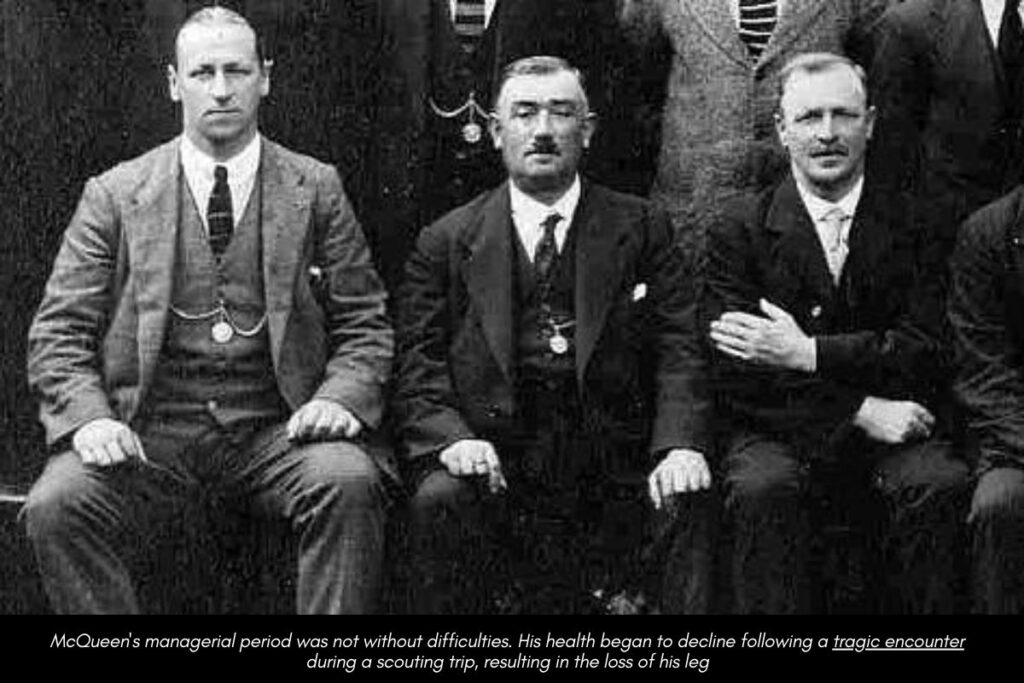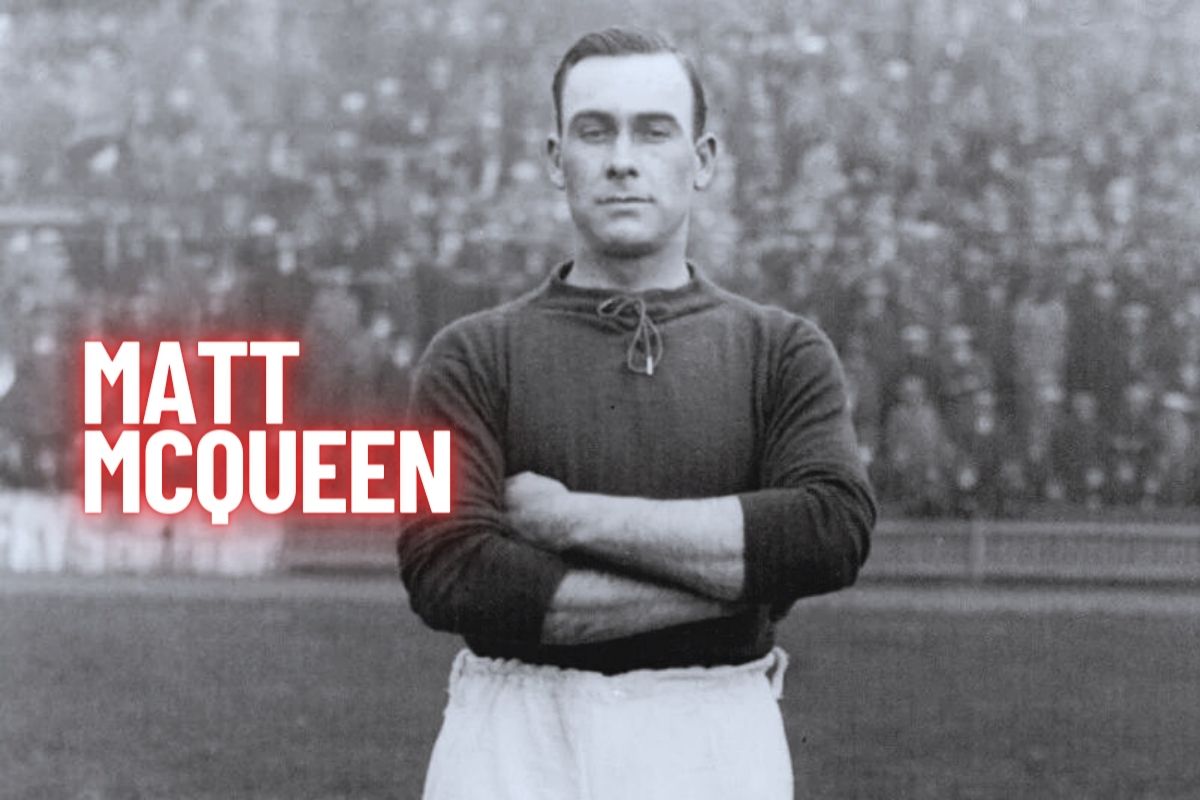Matt McQueen, a cornerstone in Liverpool FC’s early history, played and managed the club with enduring dedication. Joining Liverpool in its infancy, he showcased versatility on the field before transitioning to a managerial role in the 1920s. His tenure, marked by significant challenges, laid the groundwork for future triumphs. This article explores McQueen’s dual career, his impact on Liverpool’s development, and the legacy he left behind, offering a detailed look at his contributions to the club.
Early Life and Career
Matt McQueen was born on May 18, 1863, in Harthill, Lanarkshire, Scotland. Growing up in a football-loving environment, McQueen’s passion for the sport emerged early. He began his football career with Leith Athletic, a club he would return to later in his career, and also had a notable stint with Heart of Midlothian. His breakthrough into professional football came in October 1892 when he was signed by Liverpool’s founding managers, John McKenna and William Barclay.
McQueen’s debut for Liverpool was spectacular; he played in a 9–0 victory over Newtown in the FA Cup on October 29, 1892. Known for his versatility, he not only scored goals but also played in various positions, including goalkeeper. This adaptability helped him become a unique figure in football history, winning Second Division championships with Liverpool both as an outfield player and a goalkeeper. These early achievements set the stage for his long-lasting impact at Liverpool FC.
Management Career at Anfield
Matt McQueen’s managerial career at Liverpool began under unexpected circumstances in early 1923 when David Ashworth, the club’s manager, resigned despite having led Liverpool to the league title the previous season. At nearly 60 years old, McQueen stepped in as a temporary measure, quickly proving his worth by guiding the team to successfully defend their First Division championship.

McQueen’s tenure, lasting until 1928, was marked by his ability to navigate the club through challenging times. He became the first former Liverpool player to manage the team, a testament to his deep understanding and connection with the club. One of his most significant contributions as manager was the signing of South African striker Gordon Hodgson, who would become one of Liverpool’s most prolific goal-scorers, netting nearly 250 goals in under 400 appearances.
McQueen’s managerial period was not without difficulties. His health began to decline following a tragic encounter during a scouting trip, resulting in the loss of his leg. Despite this setback, he continued to manage the team until his retirement in February 1928. McQueen’s leadership and resilience during his managerial career helped stabilize and shape Liverpool FC during a formative period, leaving a lasting legacy that contributed to the club’s future successes. His ability to lead through adversity and make pivotal decisions, such as key player signings, underscored his impactful tenure at Liverpool.
Achievements and Honours
Matt McQueen’s tenure at Liverpool FC was marked by a series of record-breaking achievements and memorable moments that underscored his versatility and commitment. One of McQueen’s most notable records is his unique distinction of winning Football League Second Division championships both as an outfield player and a goalkeeper, an achievement unparalleled in English football history. He played in every outfield position and also made 49 appearances as a goalkeeper, showcasing his adaptability and dedication to the team.
Among Matt McQueen’s standout performances was his debut on October 29, 1892, in a 9–0 thrashing of Newtown in the FA Cup, where he left an immediate mark. Another memorable match was Liverpool’s first-ever Football League game on September 2, 1893, a 2–0 victory over Middlesbrough Ironopolis, with McQueen playing a crucial role. As a manager, McQueen’s ability to perform in critical situations was evident when he guided Liverpool to their first back-to-back First Division championships in the early 1920s. His tenure saw the signing of South African striker Gordon Hodgson, who would become one of Liverpool’s most prolific goal-scorers.
David Ashworth vs. Matt McQueen
David Ashworth and Matt McQueen both played pivotal roles in Liverpool FC’s early history, each contributing uniquely to the club’s success. Ashworth, who managed Liverpool from 1920 to 1923, led the team to their first league title in the 1921-22 season. His tenure was marked by tactical acumen and effective team management, establishing a solid foundation for the club’s competitive stature.

In contrast, McQueen took over under unexpected circumstances in 1923 after Ashworth’s sudden resignation. Despite his advanced age and the challenging situation, McQueen managed to lead Liverpool to back-to-back league titles, demonstrating remarkable resilience and leadership. Unlike Ashworth, McQueen’s deep connection to the club as a former player and director provided him with a unique perspective and commitment to Liverpool’s long-term success. While Ashworth’s contributions were crucial in setting the stage for Liverpool’s early triumphs, Matt McQueen’s tenure was characterized by his ability to sustain and build upon this success, even in the face of personal and professional adversity. Both managers, through their distinct approaches and achievements, significantly shaped Liverpool’s early history and enduring legacy.
Life Outside Football
Beyond the football pitch, Matt McQueen led a life characterized by dedication and resilience. Born in Harthill, Lanarkshire, Scotland, McQueen’s early years were steeped in the hardworking culture of his Scottish roots. This background likely contributed to the perseverance and versatility he displayed throughout his football career.
Outside of football, Matt McQueen’s interests and activities painted a picture of a well-rounded individual. After retiring as a player, he pursued the necessary qualifications to become a Football League referee, officiating briefly as a linesman in 1904. This move demonstrated his continued passion for the sport and a desire to stay connected with football even off the pitch. McQueen’s life took a challenging turn following a severe road accident while on a scouting mission in Sheffield, resulting in the loss of his leg.
Despite this, his indomitable spirit saw him remain a frequent visitor to Liverpool FC, staying closely involved with the club he loved. Living near Anfield on Kemlyn Road, his home became a landmark, eventually replaced by the Centenary Stand. Matt McQueen’s personal life was marked by his strong connection to Liverpool FC and the local community. He remained a beloved figure at the club until his passing on September 28, 1944, at the age of 81. His story is one of resilience, passion, and unwavering loyalty, both on and off the field.
Conclusion
Matt McQueen’s multifaceted career at Liverpool FC, from a versatile player to a resilient manager, significantly shaped the club’s early history. His unique achievements, such as winning Second Division titles both as an outfield player and goalkeeper, and guiding the team to back-to-back First Division championships, highlight his profound impact. Despite personal hardships, McQueen’s dedication and leadership left an indelible mark on Liverpool. His story, intertwined with the club’s formative years, is a testament to his unwavering commitment and lasting legacy, underscoring his role as a cornerstone in the storied history of Liverpool FC.
Read all other posts on Matt McQueen
Find the Latest News on Player Ratings | Transfers | Prematch | Postmatch
Stay tuned for more updates on Liverpool FC Times and Stories. Your thoughts are always welcome in the comments section. Thank you for your continued support!
YNWA (You’ll Never Walk Alone)!
The Liverpool FC Times Team
LiverpoolFCTimes.com
